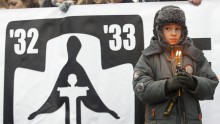We have learned lately that the Knesset’s leadership has put on that body’s agenda the issue of recognizing the Holodomor as an act of genocide against the Ukrainian people. The initiative was submitted by MK Nava Boker after she visited, with a group of her colleagues, the Holodomor Memorial Museum in Kyiv.
“For many years, the Knesset has refused to debate the Holodomor, not recognizing it as ‘an act of genocide against the Ukrainian people’ and ‘an act of violence against humanity,’ which the Stalinist regime employed to destroy people. It is high time to change the situation,” the legislator noted.
The resolution on recognition of the Holodomor as an act of genocide against the Ukrainians was initiated by Consul of the State of Israel in western Ukraine Oleg Vishnyakov, who during the commemorative events held on the 75th anniversary of the Babyn Yar tragedy invited the Israeli delegation to visit the Holodomor Memorial Museum in Kyiv. The visit to the memorial was the first in the history of bilateral relations between Ukraine and Israel. When speaking at the event, Vishnyakov stressed that the Ukrainian and Israeli peoples had similar histories, so the two nations could understand each other well. “The Holodomor is one of the saddest and most tragic pages of Ukrainian history. It was a real genocide against people, when millions of people died horrible deaths at the hands of the Communist regime.”
“UKRAINE HAS A FLAWLESS HISTORY OF DECISIONS CONCERNING ISRAEL”
Yurii SHCHERBAK, political writer, Ambassador of Ukraine to Israel (1992-94):
“This is very good news. For years, Ukraine has asked and insisted that the Israeli parliament pass an appropriate decision on recognition of the Holodomor just like many countries, including Ukraine, have passed measures condemning the genocide of Jews committed during World War Two, which is known as the Holocaust. In this regard, Ukraine has a flawless history of decisions concerning Israel. I would like to recall here the recent solemn commemoration of the Jews killed in Kyiv’s Babyn Yar during the war in 1941. Thus, we can only welcome the inclusion of the Ukrainian Holodomor issue in the Knesset’s agenda.
“I will be very happy should it be approved. But frankly speaking, I have very serious doubts about this document ever making it into law. There are two reasons for it. Firstly, leaders of the Jewish state have always answered our requests by stating that all such issues are of little interest to them, because the main thrust of Israel’s policy is to protect the Jewish people and publicize its suffering during World War Two, not do the same for other situations, including the Holodomor in Ukraine. We received just such a response repeatedly. Secondly, Israel is heavily dependent on Russia and its policies in the Middle East. Of course, Russia has recently taken some very hostile steps towards Israel. I mean, for example, the transfer of weapons to Hamas and other Arab regimes that are hostile to Israel. Nevertheless, Russia remains a powerful factor for Israel, which deters that country from expressing its sympathies for Ukraine. So I do not really believe that such a decision will be taken. But if it is, the recognition of the Holodomor as an act of genocide will be a very positive and significant step on the part of the State of Israel regarding Ukraine and its tragic history.”
“JUST LIKE THE HOLOCAUST, THE HOLODOMOR SHOULD BE RECOGNIZED AS A UNIVERSAL HUMAN TRAGEDY”
Josef ZISSELS, public figure and Soviet-era dissident, chairman of the Association of Jewish Organizations and Communities of Ukraine:
“Indeed, we need to have the Holodomor recognized, just like the Holocaust has been, as a universal human tragedy not limited to one nation or ethnic group. Moreover, victims of the Holodomor included not only ethnic Ukrainians, but also members of other ethnic groups living in Ukraine at the time. Therefore, it is a very important question.
“But I do not know if the Knesset is ready for it. The fact that the Knesset has put this issue forward for consideration is very important. But I would like that body to make a positive decision on it. After all, the vote on a UN resolution on Crimea will be held this week, and Israel’s position on this vote is very important as well. It is especially so after Dmitry Medvedev’s visit, as he certainly lobbied for a negative Israeli vote on this matter. All these questions are very important. Of course, I would like to see the Knesset recognizing the Holodomor on behalf of the people of Israel as an act of genocide.
“It is possible that this matter will be considered and postponed. But I think it will be no good if we see a negative decision taken, because it would delay for a long time another opportunity to re-examine this matter.
“The very fact of the Knesset deciding to debate this issue came due to lobbying efforts and promotion of bilateral relations. Israel is increasingly getting to know Ukraine better just like Ukraine is increasingly getting to know Israel better in this relationship context. The Israeli side, or at least that group in the Knesset which has put this matter forward for consideration, understands how important it is for Ukraine.
“I think Ukraine is generally underperforming in its external relations, including links to various NGOs, parties, publication of materials on the situation in Ukraine. And our embassy, I think, is underperforming in many ways as well. I think that Ukraine could do far more in this regard. We see that this effort is more advanced in some countries, such as Canada. It is important to get as many materials about Ukraine as possible published in Israel. And they should not be placed in the Russian-language press, but rather in the Hebrew- and English-language press, because most Israelis read precisely these latter press outlets.”







